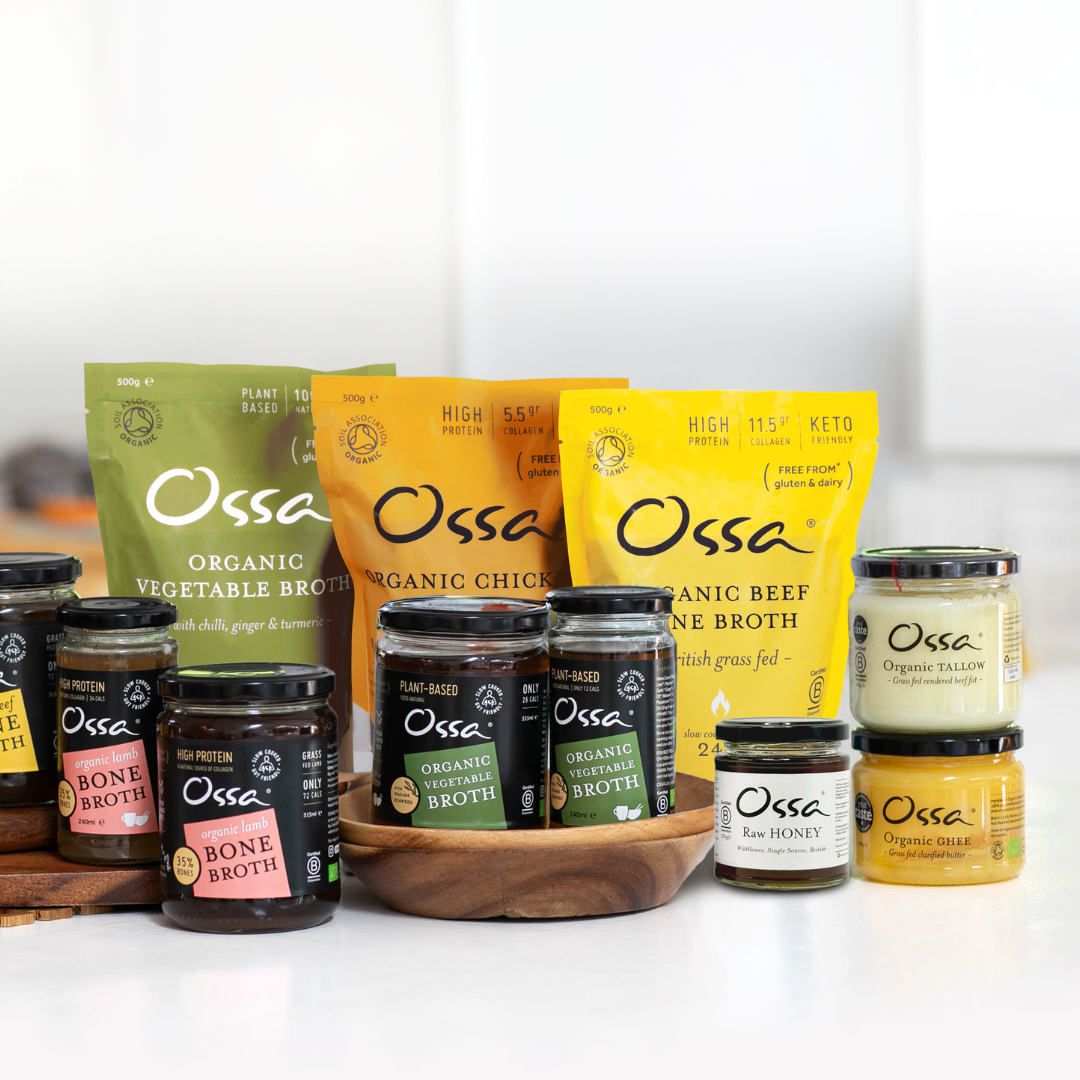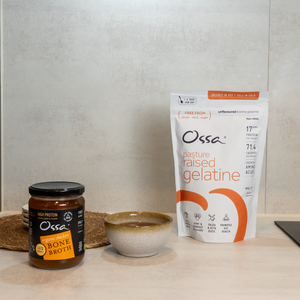Mental clarity is one of those things you don’t notice until it’s gone. Whether it’s trouble focusing, constant brain fog, low motivation, or a general sense of mental sluggishness many of us have come to accept these symptoms as a normal part of modern life. But what if the root of these issues lies not in the mind, but in the gut?
Science is catching up with what ancient traditions have always understood: our brains and bellies are deeply connected. And when the gut is inflamed, imbalanced, or undernourished, the brain often suffers, too.
We believe that food is one of the most powerful tools to restore clarity, energy, and mood. Not just any food but gut healing foods rich in amino acids, collagen, clean fats, and time-tested nutrition. Let’s explore how your gut affects your mind and how to support both through everyday meals.
The Gut–Brain Axis: A Two-Way Street
The gut and the brain are in constant conversation via the vagus nerve, a key communication highway that links the two. What happens in the gut sends signals to the brain and vice versa.
This is known as the gut–brain axis. When your gut is healthy, your brain receives messages of calm, balance, and focus. When it’s unhealthy due to processed foods, chronic stress, antibiotic use, or lack of diversity in your gut microbiome the brain receives distress signals, leading to symptoms such as:
-
Brain fog
-
Fatigue
-
Anxiety
-
Mood swings
-
Poor concentration
-
Memory issues
In children, this can show up as behavioural issues, restlessness, irritability, or learning challenges.
Your Second Brain: The Gut’s Intelligence
There’s a reason the gut is called the second brain. It contains over 100 million neurons more than the spinal cord and produces around 95% of your serotonin, the neurotransmitter associated with happiness and calm.
The gut is also responsible for creating dopamine, GABA, and acetylcholine chemicals that affect focus, mood, and motivation. An unhealthy gut impairs the production of these chemicals, which may lead to symptoms resembling anxiety or depression.
This means supporting your mental clarity isn’t just about brain hacks, productivity tools, or coffee. It starts in the digestive tract.
Inflammation and the Mental Cloud
When the gut lining is damaged a condition often referred to as leaky gut undigested particles and toxins can escape into the bloodstream, triggering widespread inflammation.
This inflammation affects the brain and nervous system, leading to:
-
Slower cognitive function
-
Trouble remembering things
-
Increased sensitivity to stress
-
Fatigue that isn’t solved by sleep
Chronic inflammation, even at low levels, is a major contributor to both physical and mental health issues. Reducing gut inflammation is a powerful first step toward mental clarity.
Gut Healing Foods: What to Eat for Brain Balance
Not all food supports mental clarity. Processed snacks, refined carbs, excessive sugar, artificial flavours, and inflammatory oils contribute to gut damage, mood instability, and fatigue.
Gut healing foods do the opposite they calm inflammation, seal the gut lining, and feed the beneficial microbes that support neurotransmitter production.
Here are some foundational gut healing foods to focus on:
1. Bone Broth
Rich in collagen, amino acids (like glycine and proline), and minerals, bone broth supports gut repair and soothes inflammation. Glycine also has calming effects on the brain, supporting sleep and focus.
2. Gelatine
A gentle way to get the benefits of collagen, gelatine supports digestive health, balances stomach acid, and helps seal the gut lining. It also stabilises blood sugar important for stable mood and energy.
3. Healthy Fats (like ghee or tallow)
The brain is made up of 60% fat. Including clean animal fats in the diet supports hormone balance, brain repair, and steady energy. Unlike seed oils, these fats are stable and anti-inflammatory.
4. Fermented Foods
Yoghurt, sauerkraut, kefir, and kimchi provide beneficial bacteria that support a healthy gut microbiome a crucial factor for mental health and immunity.
5. Root Vegetables and Seasonal Produce
Fibre feeds beneficial gut bacteria and helps create short-chain fatty acids like butyrate, which reduce inflammation in the brain.
Amino Acids: Brain Food from the Gut
Amino acids are the building blocks of protein and neurotransmitters. Without them, your brain simply can’t function properly.
Bone broth, meat, eggs, and fish provide essential amino acids like:
-
Tryptophan – needed to make serotonin
-
Tyrosine – supports dopamine and focus
-
Glycine – calming, improves sleep
-
Glutamine – heals the gut lining and supports memory
If you’ve ever felt calmer or more focused after a warm bowl of broth, this is why. You're not just feeding your body you're supplying your brain with the compounds it needs to stay sharp.
Signs Your Gut Is Impacting Your Mental Clarity
You don’t need a diagnosis to know when something feels off. Here are common signs that your gut health may be interfering with your mental sharpness:
-
Brain fog after meals
-
Energy crashes in the afternoon
-
Irritability or mood swings for no clear reason
-
Trouble focusing on tasks
-
Light sensitivity or frequent headaches
-
Digestive issues (bloating, gas, irregular bowel movements)
-
Poor sleep or waking feeling unrested
If you’re nodding your head to more than one of these, it may be time to shift your focus toward your digestive health.
Managing Stress: Another Key to Gut and Brain Health
Stress impacts digestion almost instantly. It reduces stomach acid, slows down enzyme production, and shuts down blood flow to the gut. This leads to indigestion, poor absorption of nutrients, and microbial imbalance.
Chronic stress can also damage the gut lining and reduce microbial diversity.
To support both gut and brain:
-
Chew meals slowly
-
Eat without distractions
-
Take a short walk after eating
-
Breathe deeply before meals
-
Use adaptogens or herbal teas like chamomile, tulsi, or lemon balm
The Mental Health-Gut Connection in Children
Kids are especially sensitive to this connection. A child with a disrupted gut may experience:
-
Frequent meltdowns or anxiety
-
Difficulty focusing in school
-
Sleep disturbances
-
Skin rashes or allergies
-
Tummy aches or constipation
Many of these signs are written off as behavioural or developmental issues, when they are actually signs of gut inflammation.
By introducing gut healing foods early through soups, stews, jellies, and broths you can support balanced mood, better learning, and fewer immune challenges.
Why We Do What We Do at Ossa Organic
Our mission is not just to sell products. It’s to restore the connection between food and health to make it easier for families to choose nutrition that truly supports the body and mind.
Every jar of broth we simmer. Every pack of gelatine we seal. Every customer we connect with. It all comes from a place of wanting people to feel better in their bodies and clearer in their minds.
You don’t need a dozen supplements or complicated meal plans. You need real, whole, gut healing foods





